Employment Law Case Analysis: Alberta Human Rights Tribunal Decision
VerifiedAdded on 2022/08/23
|6
|1072
|14
Report
AI Summary
This assignment analyzes the employment law case of McLaughlan v. Lakeland College, focusing on a complaint of discrimination based on physical and mental disability. The case involves a student, Ms. Karin McLaughlan, who alleged discrimination by Lakeland College due to the discontinuation of the SLIP program. The report outlines the facts, issues, and arguments presented by both parties, including the college's denial of discrimination and the complainant's claim of adverse impact on accessing general education. The analysis includes the legal test for discrimination and the burden of proof. The report describes the final decision of the Alberta Human Rights Tribunal, which dismissed the complaint based on the evidence presented, concluding that a prima facie case of discrimination was not established. The decision was made considering the evidence that was gathered by the parties, and the onus of proof that rested with the complainant.
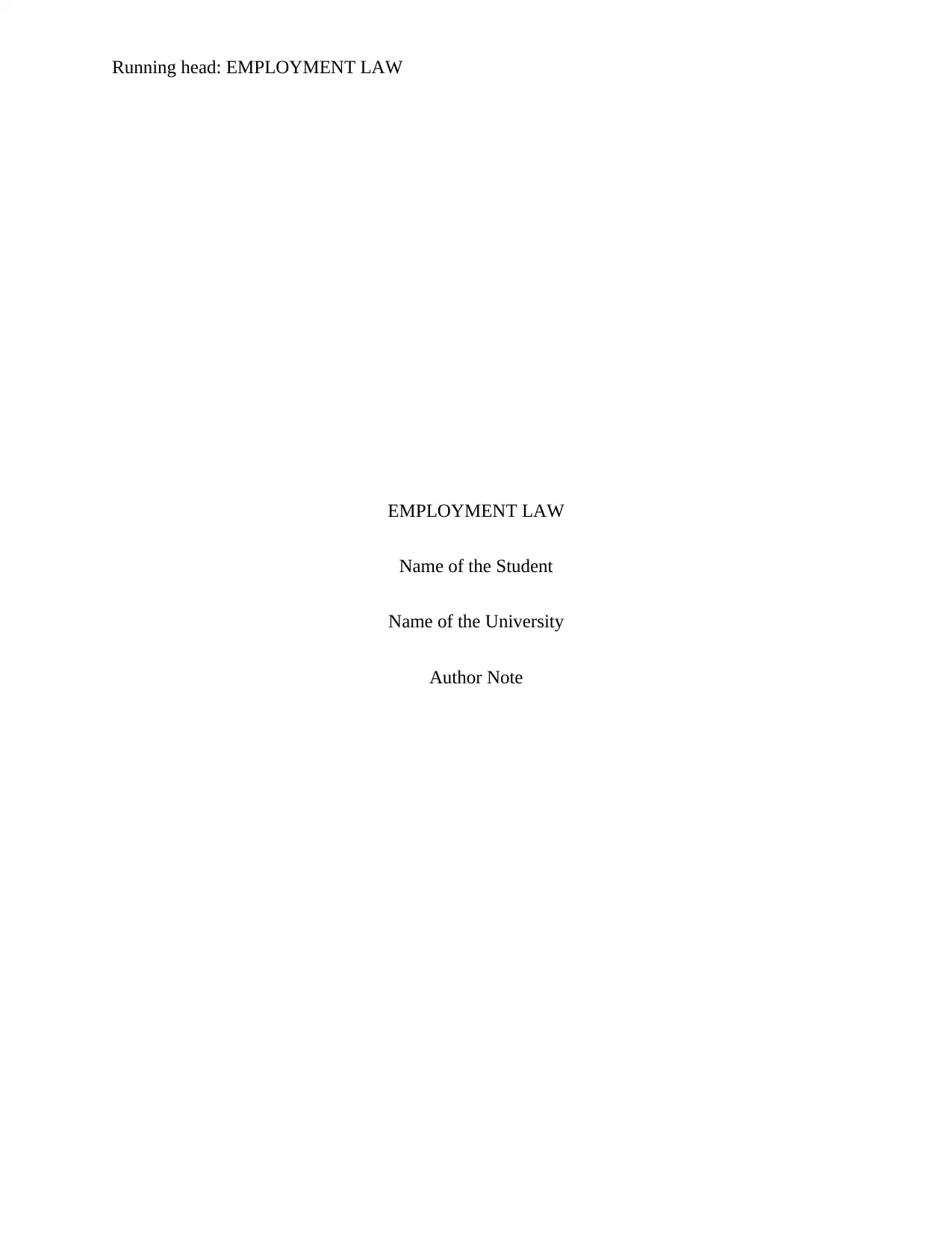
Running head: EMPLOYMENT LAW
EMPLOYMENT LAW
Name of the Student
Name of the University
Author Note
EMPLOYMENT LAW
Name of the Student
Name of the University
Author Note
Paraphrase This Document
Need a fresh take? Get an instant paraphrase of this document with our AI Paraphraser
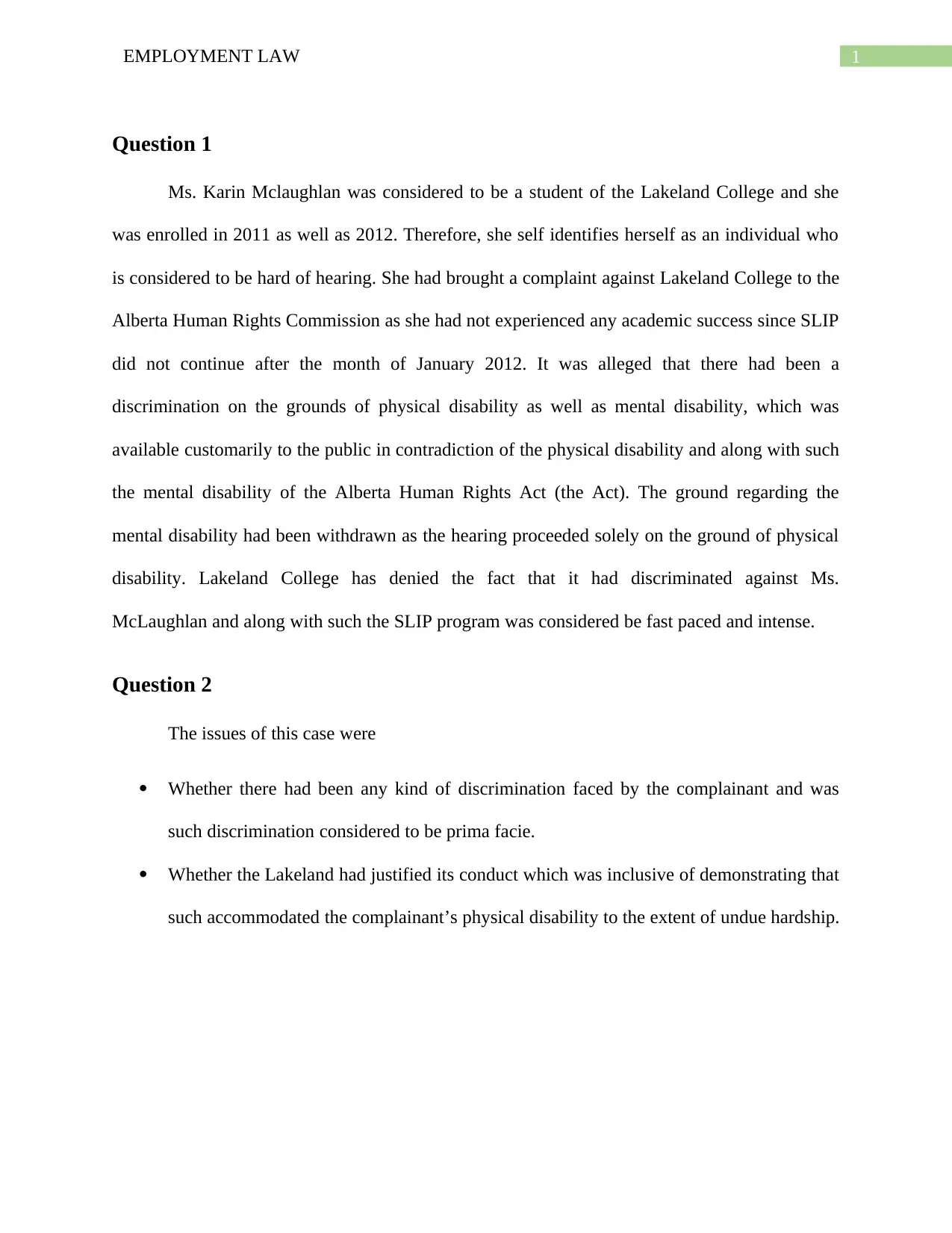
1EMPLOYMENT LAW
Question 1
Ms. Karin Mclaughlan was considered to be a student of the Lakeland College and she
was enrolled in 2011 as well as 2012. Therefore, she self identifies herself as an individual who
is considered to be hard of hearing. She had brought a complaint against Lakeland College to the
Alberta Human Rights Commission as she had not experienced any academic success since SLIP
did not continue after the month of January 2012. It was alleged that there had been a
discrimination on the grounds of physical disability as well as mental disability, which was
available customarily to the public in contradiction of the physical disability and along with such
the mental disability of the Alberta Human Rights Act (the Act). The ground regarding the
mental disability had been withdrawn as the hearing proceeded solely on the ground of physical
disability. Lakeland College has denied the fact that it had discriminated against Ms.
McLaughlan and along with such the SLIP program was considered be fast paced and intense.
Question 2
The issues of this case were
Whether there had been any kind of discrimination faced by the complainant and was
such discrimination considered to be prima facie.
Whether the Lakeland had justified its conduct which was inclusive of demonstrating that
such accommodated the complainant’s physical disability to the extent of undue hardship.
Question 1
Ms. Karin Mclaughlan was considered to be a student of the Lakeland College and she
was enrolled in 2011 as well as 2012. Therefore, she self identifies herself as an individual who
is considered to be hard of hearing. She had brought a complaint against Lakeland College to the
Alberta Human Rights Commission as she had not experienced any academic success since SLIP
did not continue after the month of January 2012. It was alleged that there had been a
discrimination on the grounds of physical disability as well as mental disability, which was
available customarily to the public in contradiction of the physical disability and along with such
the mental disability of the Alberta Human Rights Act (the Act). The ground regarding the
mental disability had been withdrawn as the hearing proceeded solely on the ground of physical
disability. Lakeland College has denied the fact that it had discriminated against Ms.
McLaughlan and along with such the SLIP program was considered be fast paced and intense.
Question 2
The issues of this case were
Whether there had been any kind of discrimination faced by the complainant and was
such discrimination considered to be prima facie.
Whether the Lakeland had justified its conduct which was inclusive of demonstrating that
such accommodated the complainant’s physical disability to the extent of undue hardship.
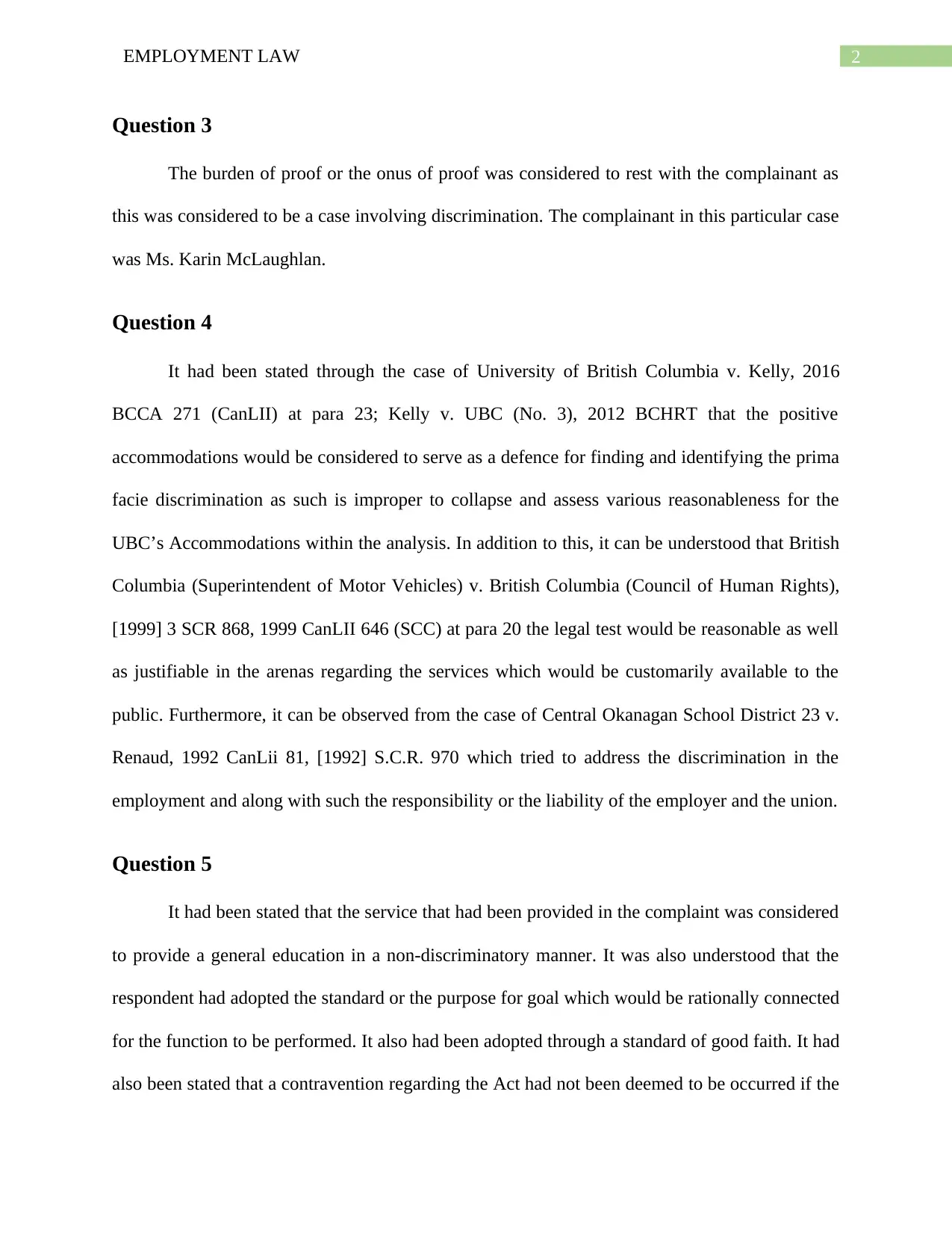
2EMPLOYMENT LAW
Question 3
The burden of proof or the onus of proof was considered to rest with the complainant as
this was considered to be a case involving discrimination. The complainant in this particular case
was Ms. Karin McLaughlan.
Question 4
It had been stated through the case of University of British Columbia v. Kelly, 2016
BCCA 271 (CanLII) at para 23; Kelly v. UBC (No. 3), 2012 BCHRT that the positive
accommodations would be considered to serve as a defence for finding and identifying the prima
facie discrimination as such is improper to collapse and assess various reasonableness for the
UBC’s Accommodations within the analysis. In addition to this, it can be understood that British
Columbia (Superintendent of Motor Vehicles) v. British Columbia (Council of Human Rights),
[1999] 3 SCR 868, 1999 CanLII 646 (SCC) at para 20 the legal test would be reasonable as well
as justifiable in the arenas regarding the services which would be customarily available to the
public. Furthermore, it can be observed from the case of Central Okanagan School District 23 v.
Renaud, 1992 CanLii 81, [1992] S.C.R. 970 which tried to address the discrimination in the
employment and along with such the responsibility or the liability of the employer and the union.
Question 5
It had been stated that the service that had been provided in the complaint was considered
to provide a general education in a non-discriminatory manner. It was also understood that the
respondent had adopted the standard or the purpose for goal which would be rationally connected
for the function to be performed. It also had been adopted through a standard of good faith. It had
also been stated that a contravention regarding the Act had not been deemed to be occurred if the
Question 3
The burden of proof or the onus of proof was considered to rest with the complainant as
this was considered to be a case involving discrimination. The complainant in this particular case
was Ms. Karin McLaughlan.
Question 4
It had been stated through the case of University of British Columbia v. Kelly, 2016
BCCA 271 (CanLII) at para 23; Kelly v. UBC (No. 3), 2012 BCHRT that the positive
accommodations would be considered to serve as a defence for finding and identifying the prima
facie discrimination as such is improper to collapse and assess various reasonableness for the
UBC’s Accommodations within the analysis. In addition to this, it can be understood that British
Columbia (Superintendent of Motor Vehicles) v. British Columbia (Council of Human Rights),
[1999] 3 SCR 868, 1999 CanLII 646 (SCC) at para 20 the legal test would be reasonable as well
as justifiable in the arenas regarding the services which would be customarily available to the
public. Furthermore, it can be observed from the case of Central Okanagan School District 23 v.
Renaud, 1992 CanLii 81, [1992] S.C.R. 970 which tried to address the discrimination in the
employment and along with such the responsibility or the liability of the employer and the union.
Question 5
It had been stated that the service that had been provided in the complaint was considered
to provide a general education in a non-discriminatory manner. It was also understood that the
respondent had adopted the standard or the purpose for goal which would be rationally connected
for the function to be performed. It also had been adopted through a standard of good faith. It had
also been stated that a contravention regarding the Act had not been deemed to be occurred if the
⊘ This is a preview!⊘
Do you want full access?
Subscribe today to unlock all pages.

Trusted by 1+ million students worldwide
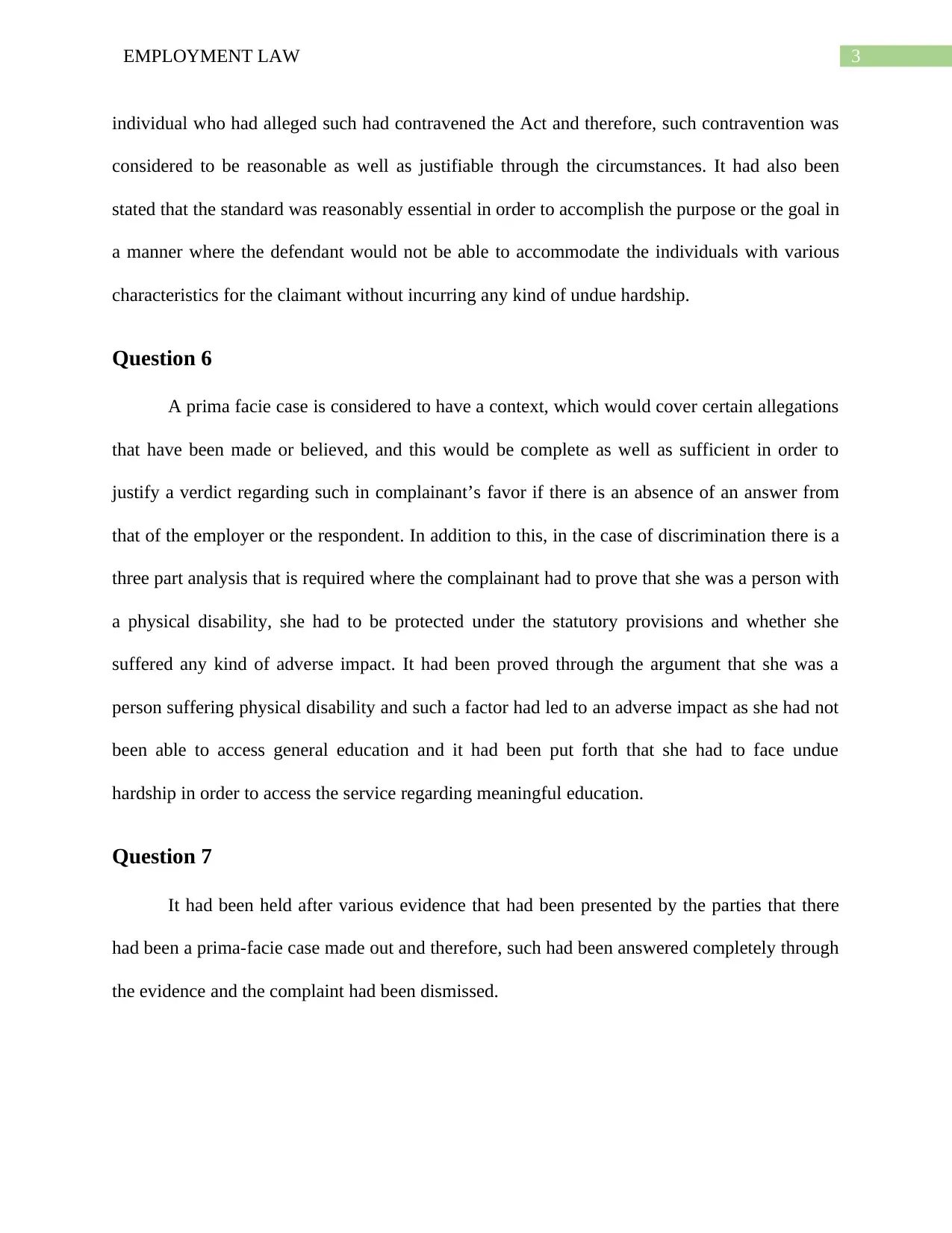
3EMPLOYMENT LAW
individual who had alleged such had contravened the Act and therefore, such contravention was
considered to be reasonable as well as justifiable through the circumstances. It had also been
stated that the standard was reasonably essential in order to accomplish the purpose or the goal in
a manner where the defendant would not be able to accommodate the individuals with various
characteristics for the claimant without incurring any kind of undue hardship.
Question 6
A prima facie case is considered to have a context, which would cover certain allegations
that have been made or believed, and this would be complete as well as sufficient in order to
justify a verdict regarding such in complainant’s favor if there is an absence of an answer from
that of the employer or the respondent. In addition to this, in the case of discrimination there is a
three part analysis that is required where the complainant had to prove that she was a person with
a physical disability, she had to be protected under the statutory provisions and whether she
suffered any kind of adverse impact. It had been proved through the argument that she was a
person suffering physical disability and such a factor had led to an adverse impact as she had not
been able to access general education and it had been put forth that she had to face undue
hardship in order to access the service regarding meaningful education.
Question 7
It had been held after various evidence that had been presented by the parties that there
had been a prima-facie case made out and therefore, such had been answered completely through
the evidence and the complaint had been dismissed.
individual who had alleged such had contravened the Act and therefore, such contravention was
considered to be reasonable as well as justifiable through the circumstances. It had also been
stated that the standard was reasonably essential in order to accomplish the purpose or the goal in
a manner where the defendant would not be able to accommodate the individuals with various
characteristics for the claimant without incurring any kind of undue hardship.
Question 6
A prima facie case is considered to have a context, which would cover certain allegations
that have been made or believed, and this would be complete as well as sufficient in order to
justify a verdict regarding such in complainant’s favor if there is an absence of an answer from
that of the employer or the respondent. In addition to this, in the case of discrimination there is a
three part analysis that is required where the complainant had to prove that she was a person with
a physical disability, she had to be protected under the statutory provisions and whether she
suffered any kind of adverse impact. It had been proved through the argument that she was a
person suffering physical disability and such a factor had led to an adverse impact as she had not
been able to access general education and it had been put forth that she had to face undue
hardship in order to access the service regarding meaningful education.
Question 7
It had been held after various evidence that had been presented by the parties that there
had been a prima-facie case made out and therefore, such had been answered completely through
the evidence and the complaint had been dismissed.
Paraphrase This Document
Need a fresh take? Get an instant paraphrase of this document with our AI Paraphraser
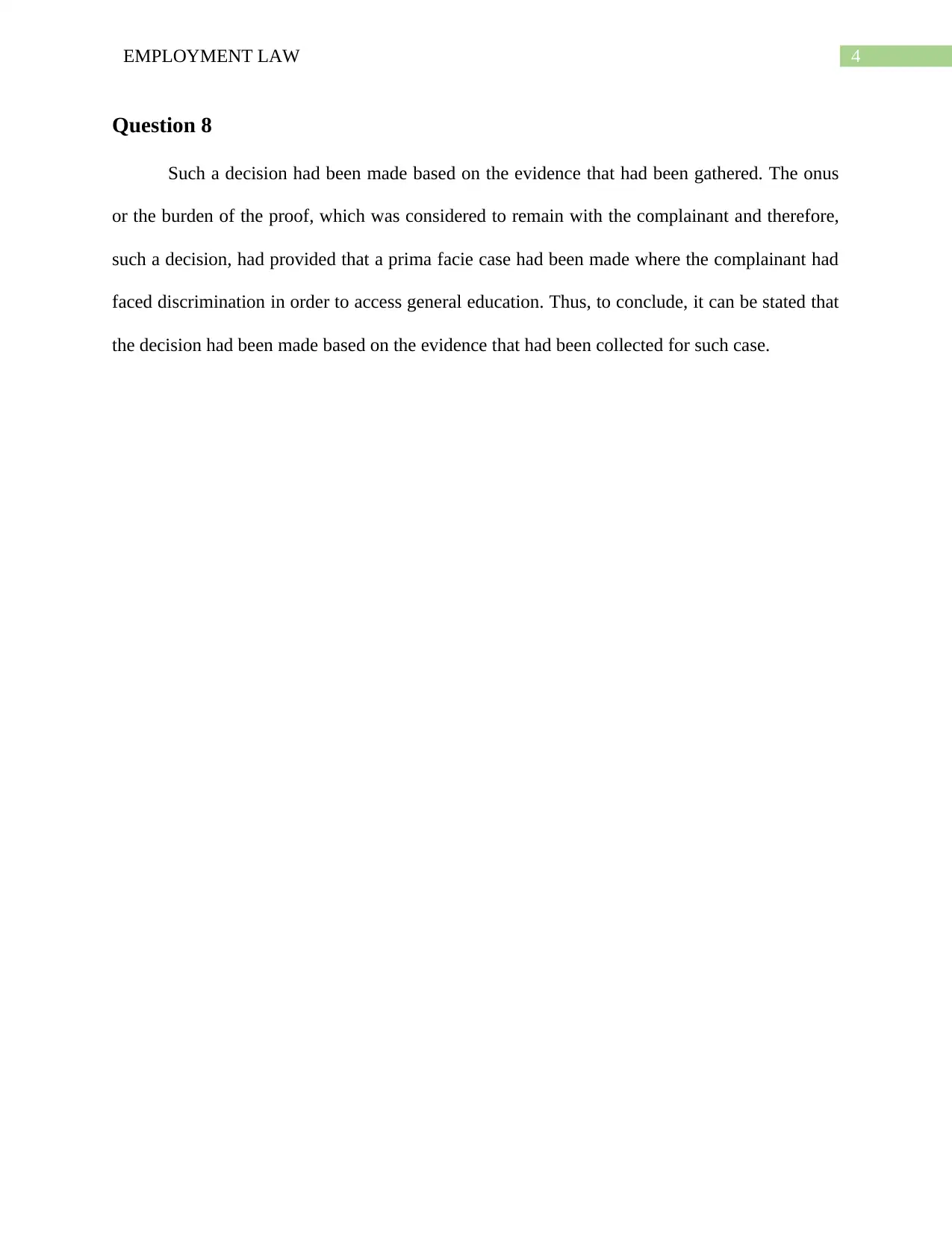
4EMPLOYMENT LAW
Question 8
Such a decision had been made based on the evidence that had been gathered. The onus
or the burden of the proof, which was considered to remain with the complainant and therefore,
such a decision, had provided that a prima facie case had been made where the complainant had
faced discrimination in order to access general education. Thus, to conclude, it can be stated that
the decision had been made based on the evidence that had been collected for such case.
Question 8
Such a decision had been made based on the evidence that had been gathered. The onus
or the burden of the proof, which was considered to remain with the complainant and therefore,
such a decision, had provided that a prima facie case had been made where the complainant had
faced discrimination in order to access general education. Thus, to conclude, it can be stated that
the decision had been made based on the evidence that had been collected for such case.
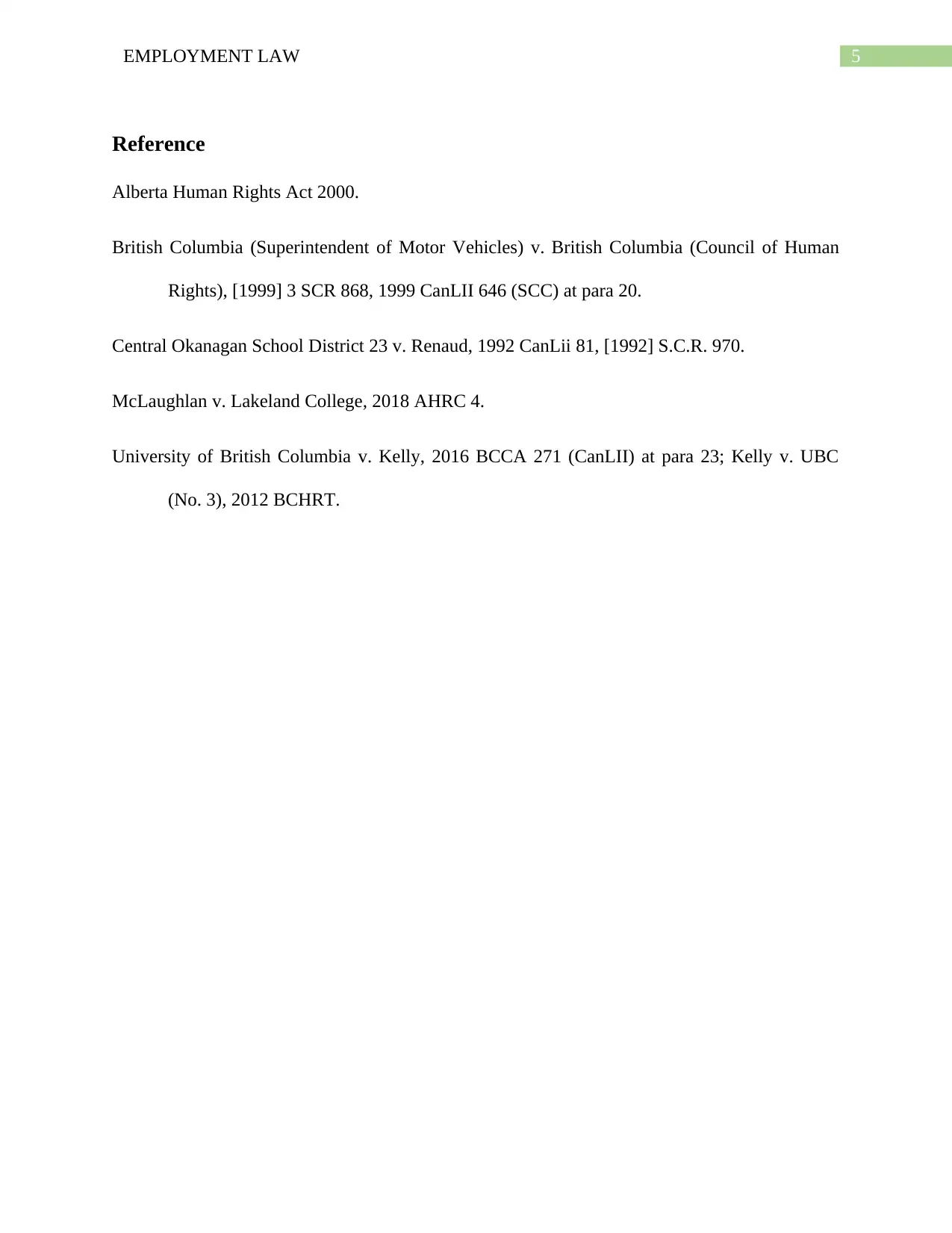
5EMPLOYMENT LAW
Reference
Alberta Human Rights Act 2000.
British Columbia (Superintendent of Motor Vehicles) v. British Columbia (Council of Human
Rights), [1999] 3 SCR 868, 1999 CanLII 646 (SCC) at para 20.
Central Okanagan School District 23 v. Renaud, 1992 CanLii 81, [1992] S.C.R. 970.
McLaughlan v. Lakeland College, 2018 AHRC 4.
University of British Columbia v. Kelly, 2016 BCCA 271 (CanLII) at para 23; Kelly v. UBC
(No. 3), 2012 BCHRT.
Reference
Alberta Human Rights Act 2000.
British Columbia (Superintendent of Motor Vehicles) v. British Columbia (Council of Human
Rights), [1999] 3 SCR 868, 1999 CanLII 646 (SCC) at para 20.
Central Okanagan School District 23 v. Renaud, 1992 CanLii 81, [1992] S.C.R. 970.
McLaughlan v. Lakeland College, 2018 AHRC 4.
University of British Columbia v. Kelly, 2016 BCCA 271 (CanLII) at para 23; Kelly v. UBC
(No. 3), 2012 BCHRT.
⊘ This is a preview!⊘
Do you want full access?
Subscribe today to unlock all pages.

Trusted by 1+ million students worldwide
1 out of 6
Your All-in-One AI-Powered Toolkit for Academic Success.
+13062052269
info@desklib.com
Available 24*7 on WhatsApp / Email
![[object Object]](/_next/static/media/star-bottom.7253800d.svg)
Unlock your academic potential
Copyright © 2020–2026 A2Z Services. All Rights Reserved. Developed and managed by ZUCOL.

